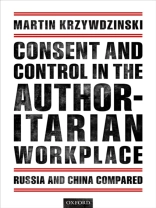Today, a large proportion of the world’s states are under authoritarian governments. These countries limit participation rights, both in the political sphere and in the workplace. At the same time, they have to generate consent in the workplace in order to ensure social stability and prevent the escalation of conflicts. But how do companies generate consent given that employee voice and interest representation may be limited or entirely absent?Based on a review of research literature from sociology, organizational psychology, and behavioural economics, this book develops a theory of consent generation and distinguishes three groups of consent-producing mechanisms: socialization, incentive mechanisms, and participation and interest representation. It presents an empirical analysis of how these mechanisms work in Russian and Chinese automotive factories and shows how socio-cultural factors and labour regulation explain the differencesbetween both countries regarding consent and control in the workplace. The book contributes to two research debates. First, it examines the generation of consent in the workplace-a core topic of the sociology of work and organization. Its particular focus is on consent generation in authoritarian societies. Secondly, the book contributes to the debate about the reasons for the completely different trajectories of post-communist Russia and China. The book provides an empirical analysis that explains the different work behaviours of employees in both countries andlinks the micro-level of the workplace and the macro-level of institutions and organizational cultures.
Martin Krzywdzinski
Consent and Control in the Authoritarian Workplace [PDF ebook]
Russia and China Compared
Consent and Control in the Authoritarian Workplace [PDF ebook]
Russia and China Compared
购买此电子书可免费获赠一本!
语言 英语 ● 格式 PDF ● 网页 296 ● ISBN 9780192529022 ● 出版者 OUP Oxford ● 发布时间 2018 ● 下载 3 时 ● 货币 EUR ● ID 7358065 ● 复制保护 Adobe DRM
需要具备DRM功能的电子书阅读器












